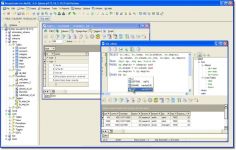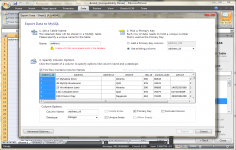 MySQL 5.0.87
MySQL 5.0.87
MySQL AB - (Open Source)
MySQL is a successful open source database used in most web applications, e-commerce and online transaction processing.
MySQL is one of the world's most famous and used open source database. The software can be used to manage web applications, e-commerce and online transaction processing since MySQL database incorporates support those transactions. It is also commonly associated with PHP when it comes to managing websites.
With standard JDBC , ODBC, and Net, the developer can choose the programming language. MySQL has the advantage of working with almost all the popular operating systems and communicate easily with programming languages ​​such as C, C + +, VB, C #, PHP, Python, Ruby, Java, Perl, Eiffel, etc.MySQL replication allows you to create profitable applications. In addition, it enables the development of typologies replication complex and massive chain.Its reliability and robustness, performance, ease of use makes MySQL have more success than anticipated.
- Title:
- MySQL 5.0.87
- File Size:
- 29.6 MB
- Requirements:
- Windows 9x / 2000 / XP / Vista / Windows7 / Windows8
- Language:
- en-us
- License:
- Open Source
- Date Added:
- 24 Oct 2009
- Publisher:
- MySQL AB
- Homepage:
- http://www.mysql.com
- MD5 Checksum:
- 67D9791C0CC40B3990F5356725912BEB
Bugs fixed:
# Incompatible Change: In binary installations of MySQL, the supplied binary-configure script would start and configure MySQL, even when request help on the command with the --help command-line option. The --help, if provided, will no longer start and install the server. (Bug#30954)
# Replication: BEGIN statements were not included in the output of mysqlbinlog. (Bug#46998)
# Replication: Database-level character sets were not always honored by the replication SQL thread. This could cause data inserted on the master using LOAD DATA to be replicated using the wrong character set. (Bug#45516)
# API: The fix for Bug#24507 could lead in some cases to client application failures due to a race condition. Now the server waits for the “dummy†thread to return before exiting, thus making sure that only one thread can initialize the POSIX threads library. (Bug#42850)
# On Mac OS X or Windows, sending a SIGHUP signal to the server or an asynchronous flush (triggered by flush_time) caused the server to crash. (Bug#47525)
# Solaris binary packages now are compiled with -g0 rather than -g. (Bug#47137)
# EXPLAIN caused a server crash for certain valid queries. (Bug#47106)
# When creating a new instance on Windows using mysqld-nt and the --install parameter, the value of the service would be set incorrectly, resulting in a failure to start the configured service. (Bug#46917)
# The server crashed when re-using outer column references in correlated subqueries when the enclosing query used a temp table. (Bug#46791)
# The server ignored the setting of sync_frm for CREATE TABLE ... LIKE. (Bug#46591)
# An attempt to create a table with the same name as an existing view could cause a server crash. (Bug#46384)
# A memory leak occurred when EXPLAIN encountered a malformed query. (Bug#45989)
# When re-installing MySQL on Windows on a server that has a data directory from a previous MySQL installation, the installer would fail to identify the existence of the installation and the password configured for the root user. (Bug#45200)
# Client flags were incorrectly initialized for the embedded server, causing several tests in the jp test suite to fail. (Bug#45159)
# A test for stack growth failed on some platforms, leading to server crashes. (Bug#42213)
# MySQL server used the wrong lock type (always TL_READ instead of TL_READ_NO_INSERT when appropriate) for tables used in subqueries of UPDATE statements. This led in some cases to replication failure because statements were written in the wrong order to the binary log. (Bug#42108)
# Concurrent execution of FLUSH TABLES along with SHOW FUNCTION STATUS or SHOW PROCEDURE STATUS could cause a server crash. (Bug#34895)
# myisamchk performed parameter value casting at startup that generated unnecessary warning messages. (Bug#33785)
# When building MySQL on Windows from source, the WITH_BERKELEY_STORAGE_ENGINE option would fail to configure BDB support correctly. (Bug#27693)
# Changing the size of a key buffer that is under heavy use could cause a server crash. The fix partially removes the limitation that LOAD INDEX INTO CACHE fails unless all indexes in a table have the same block size. Now the statement fails only if IGNORE LEAVES is specified. (Bug#17332)
Related software
2.1/5 from 178 users


